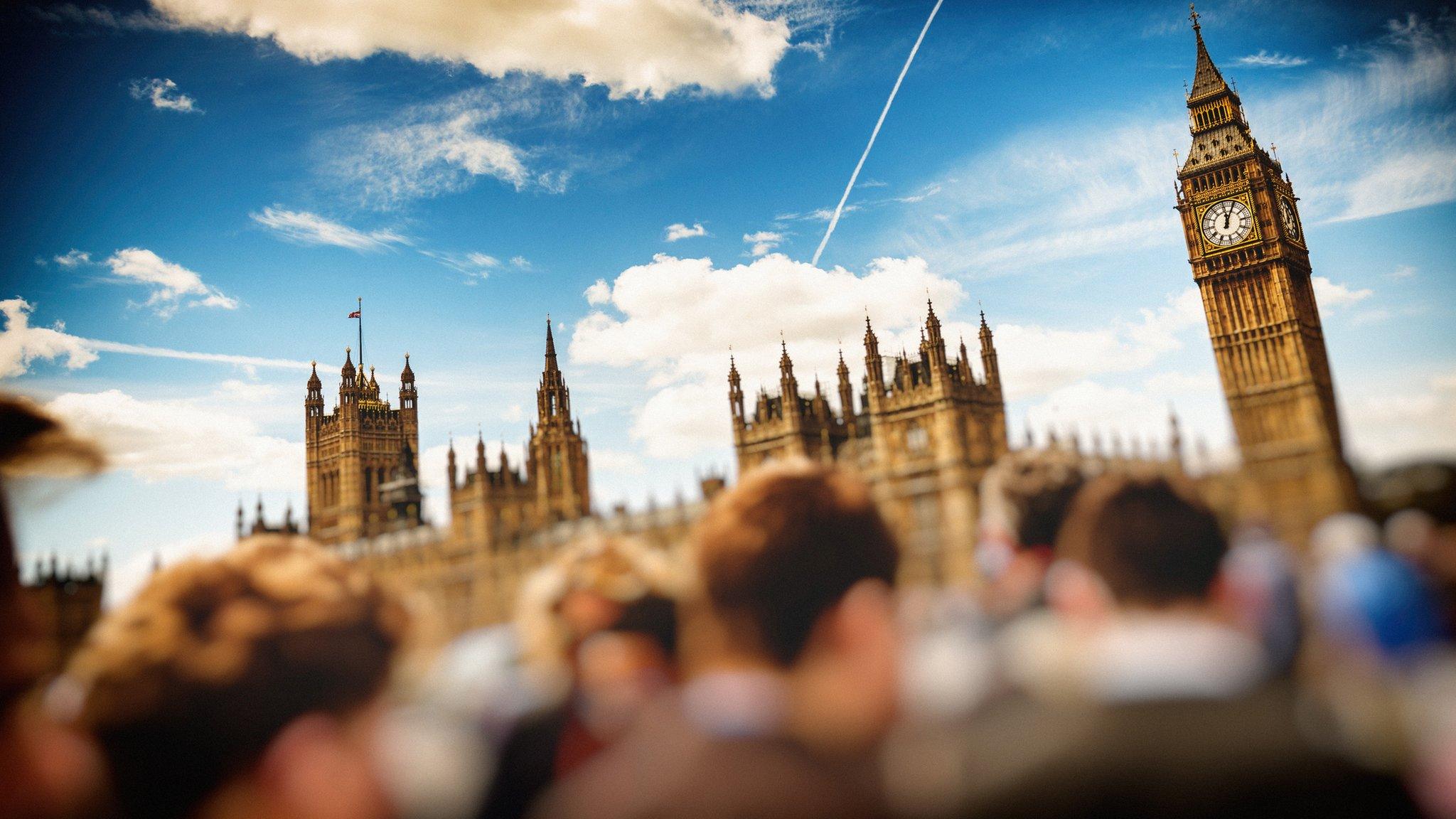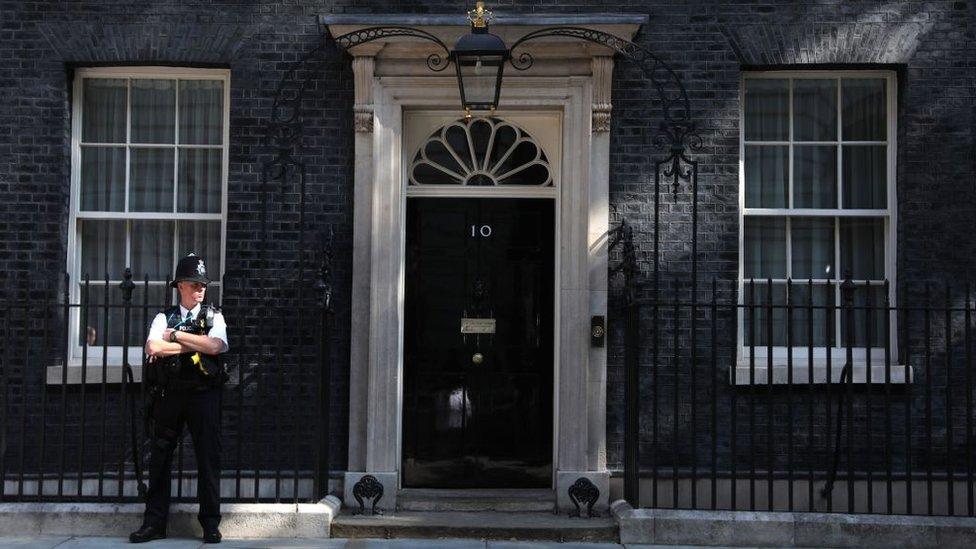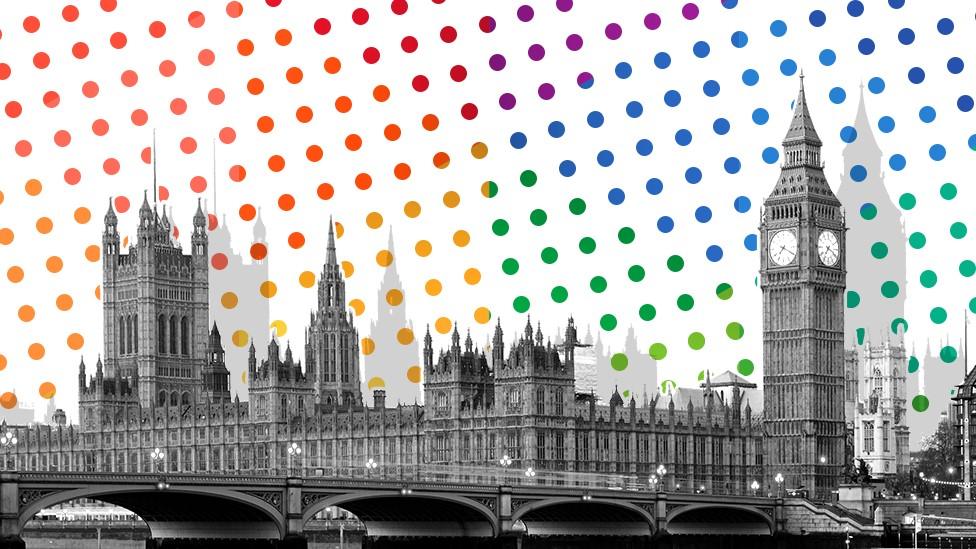General election 2019: Nine big things that haven't cut through
- Published

Plenty of promises have been made by politicians in the election campaign - but what big issues haven't cut through?
1. The UK's role in the world

One of Prime Minister Boris Johnson's favourite slogans, Global Britain, doesn't actually appear in the Conservative manifesto. There have been arguments about potential post-Brexit trade deals with the US.
Global issues such as climate change have featured prominently. And international issues were discussed during the Nato summit. But in-depth discussions about the kind of relationship the UK might want with the rest of the EU, if Brexit was to happen, have largely been avoided.
Trade talks, both with the EU and other countries around the world, could be a dominant political issue for years to come. But the choices that would have to be made, and the effect they could have on businesses up and down the country, haven't been addressed in any detail.
2. Children's services' problems

More than 78,000 children in England are now being cared for by local authorities, according to the latest official statistics - a new high. And in the last decade, the number of inquiries carried out because of fears a child is at risk, has increased by 139%, or 120,000., external At the same time, council budgets have been cut.
The problems of increasing demand and shrinking finances are well known to politicians from the crisis in adult social care. But the acute difficulties also facing children's services have not been high-profile during the election.
The major party manifestos acknowledge the system's need for review and investment, but timescales are less clear.
They say:
Labour will review the care system and rebuild early intervention
The Conservatives will review the care system and improve the Troubled Families programme
The Lib Dems will invest in children's centres and increase free childcare
The reasons for the pressures are complicated but academics say rising poverty and cuts to services providing early support for problems are factors. Councils have a legal duty to step in if a child needs protecting and many are overspending to do this.
It is a growing, unpredictable cost pushing more and more authorities towards a financial precipice. Tragically, it is also a sign many young lives are in turmoil.
3. More universities

Universities have been under the cosh over high fees, grade inflation and overpaying their bosses. So the talk has been about curbing their ambitions. But this entirely ducks the urgent need to expand university places, because they are facing a massive demographic bulge.
In the past decade the school population has risen by more than 725,000 - and this surge is about to hit universities. The Higher Education Policy Institute suggests another 300,000 university places will be needed in the next decade to keep pace.
It would be the equivalent of 12 new universities the size of those in Warwick or Southampton, or 20 the size of the Universities of Hull or Essex. Families with ambitions for their children to go to university are unlikely to accept them being squeezed out.
And this could be an opportunity to build entirely new universities to regenerate areas. But, so far, there are no signs of planning for something imminently needed.
4. Free cash machines

The number of free cash machines is falling and politicians have been clamouring for machine operators and banks to do more over the past couple of years.
In their manifestos, Labour says it will ban ATM charges and the SNP says it will fight against ATM closures.
Being able to take cash out has become harder in recent years. And, according to consumer group Which?, machines are disappearing fastest in the poorest areas of the country. The UK is certainly moving towards becoming a cashless society but it's a way off giving up physical money altogether.
It is not just the elderly who are struggling. Within the past couple of weeks, another IT failure at TSB has shown the hot water people find themselves in when payments are not made and they cannot get hold of cash.
5. Rising sea levels in the UK

Something almost all the parties have ducked is the nightmare question of how to handle rising seas: which areas of the country to save and which to abandon. Only the Labour Party's manifesto mentions a key phrase, "managed realignment", which, in the language of flood planners, is code for drawing a new coastline.
As the oceans warm and the ice caps melt, the level of the waters is increasing - only by a few millimetres a year but raising the spectre of having to decide where to invest in coastal defences and where not to.
Stretches of the Lincolnshire coast, the Humber estuary, Norfolk, and the west coast of Wales are among the UK's vulnerable areas. The awkward fact is despite all the pledges for boosted spending on flood protection, there is nowhere near enough funding to keep the entire UK shore safe.
The Treasury allocates funding in a way that favours urban areas, so cities and towns get new barriers. By and large, villages and farmland lose out and almost certainly will in future. But which politician wants to say that out loud?

CONFUSED? Our simple election guide, external
POLICY GUIDE: Who should I vote for?, external
POSTCODE SEARCH: Find your local candidates, external
ELECTION EXPLAINED: Explore our explainers pieces

6. Lower house prices

No party's manifesto contains the unpopular measures required to fix growing generational inequality. For young people to afford family homes would require not just cheaper mortgages but lower house prices.
Those wanting to climb the housing ladder would benefit because, other things being equal, the price of their current place would fall by less than that of the one they were buying. But a policy goal of lower house prices might frighten floating voters.
To help the housing crisis, parties have come up with some policies:
The Conservatives say they will introduce new long-term fixed rate mortgages
Labour says it will deliver a new social housebuilding programme of more than a million homes over a decade
The Lib Dems say they will build at least 100,000 homes for social rent each year
The Green Party says it will let local councils bring empty houses back into use.
Meanwhile, pensioners' incomes (net of housing costs) are now higher than those of people of working age. Why then do working people pay higher taxes for state pensions to rise, despite being on lower incomes than the minority of those who benefit?
The answer lies, one suspects, in the grey vote. Cutting universal pensioner benefits or scrapping the triple-lock state pension protection might make fiscal sense. It's absent from the manifestos, one suspects, because lots of pensioners make sure they vote.
7. Emergency communications

It's set to cost £9.3bn and is one of the largest and most complex projects ever undertaken by the Home Office. But there is no mention in any manifesto of the Emergency Services Network (ESN), a new communications system for the police, fire and ambulance services in England, Scotland and Wales, which has been beset by delays and overspends.
ESN is due to replace the current service, Airwave, in 2022, but the National Audit Office says "significant risks" with the project remain and it's unlikely to be delivered on time.
There will be huge questions for the incoming home secretary and ministers about whether to persevere with ESN, what the timescale should be if they do and how the programme should be managed - but voters are none the wiser.
8. Outlook for savers

The UK has lost the savings habit. An estimated 11 million people do not have £100 to fall back on, leaving finances exposed to an unexpected bill. The official savings ratio - the proportion of income after tax people save - has been low in the past three years (6.8% at the last count, compared with up to 14.4% during the 1990s).
For those who do still put money aside, the rewards have been pitiful owing to historically low interest rates and the Bank of England pumping more money into the economy, leaving little incentive for banks to offer better rates to savers.
All ages are affected - from youngsters to pensioners - and yet, there are no policies to promote saving for a rainy day and none offering a better outlook for committed savers aside from pensions. Some say the state should concentrate on building a stronger economy to bring these rewards.
Campaigners would say political parties always have plenty to say about helping those already in debt but little about shoring up finances with savings to prevent those debts building up in the first place.
9. The problem of begging

This can be one of the most visible and upsetting changes to High Streets - often more shocking in towns where begging would until recently have been unknown. People might feel sorry for those begging but also unhappy about a sense of decline and neglect in the communities where they live.
None of the parties directly addresses the increased visibility of begging, whether on the streets or on public transport. It is not the same as homelessness or rough sleeping, which are addressed in manifestos.
Begging touches on all kinds of sensitive topics - poverty, inequality, addictions, mental-health provision, migration and family breakdown - as well as housing and a sense of towns being left behind.
Should there be more interventionist support or more penalties? In their manifestos, Labour, the Lib Dems, the Green Party and Plaid Cymru support scrapping the Vagrancy Act (which allows the police to arrest rough sleepers) to protect the homeless.
But what should be the response of the incoming government?
Clarification and update, 6 December, 2019: An earlier version of this article said that children's services were not on the election agenda; that politicians had been quiet on the subject of free ATMs; that "some MPs" had supported scrapping the Vagrancy Act. These points have now been clarified.
What do the parties offer?


What are the parties promising you?
Here's a concise guide to where the parties stand on key issues like Brexit, education and the NHS.
Edited by Ian Westbrook.
- Published15 November 2019

- Published6 December 2019
